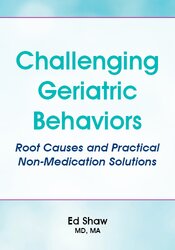
×

Behavior challenges are some of the most difficult problems family care partners and professional caregivers face when caring for an aging loved one or a person living with dementia. You will learn about the root causes of behavior challenges, a framework to assess, prevent, and manage behaviors, and a number of other non-medication-based strategies that really work!
All members of the PESI, Inc. planning committee have provided disclosures of financial relationships with ineligible organizations and any relevant non-financial relationships prior to planning content for this activity. None of the committee members had relevant financial relationships with ineligible companies or other potentially biasing relationships to disclose to learners. For speaker disclosures, please see the faculty biography.
NOTE: Tuition includes one free CE Certificate (participant will be able to print the certificate of completion after passing the online post-test (80% passing score) and completing the evaluation). Instructional methods will include PowerPoint, didactic lecture, and others.
Continuing Education Information: Listed below are the continuing education credit(s) currently available for this non-interactive self-study package. Program content is reviewed periodically per accrediting board rules for currency and appropriateness for credit. Credit approvals are subject to change. Please note, your licensing board dictates whether self-study is an acceptable form of continuing education, as well as which credit types are acceptable for continuing education hours. Please refer to your licensing board's rules and regulations. If your profession is not listed, please contact your licensing board to determine your continuing education requirements and check for reciprocal approval.
For other credit inquiries not specified below, please contact info@pesi.com or 800-844-8260 before purchase.
Materials that are included in this course may include interventions and modalities that are beyond the authorized practice of your profession. As a licensed professional, you are responsible for reviewing the scope of practice, including activities that are defined in law as beyond the boundaries of practice in accordance with and in compliance with your profession's standards.
For Planning Committee disclosures, please see the statement above. For speaker disclosures, please see the faculty biography.
Earn up to 2.0 CE hours. Please see below, for more details, as credit amounts vary by jurisdiction and profession.

PESI, Inc., #1062, is approved as an ACE provider to offer social work continuing education by the Association of Social Work Boards (ASWB) Approved Continuing Education (ACE) program. Regulatory boards are the final authority on courses accepted for continuing education credit. ACE provider approval period: January 27, 2023 - January 27, 2026. Social workers completing this course receive 1.75 Clinical continuing education credits.
Course Level: Intermediate Format: Recorded asynchronous distance. Full attendance is required; no partial credits will be offered for partial attendance.
Canadian Social Workers: Canadian provinces may accept activities approved by the ASWB for ongoing professional development.
This self-study activity qualifies for 2.0 continuing education clock hours as required by many national, state and local licensing boards and professional organizations. Save your activity advertisement and certificate of completion, and contact your own board or organization for specific requirements.
| File type | File name | Number of pages | |
|---|---|---|---|
| Manual - Challenging Geriatric Behaviors (6.67 MB) | 41 Pages | Available after Purchase | |
| Instructions for ASHA credit - Self-Study Only (64.4 KB) | Available after Purchase | ||
| Manual - Challenging Geriatric Behaviors - French (6.67 MB) | 41 Pages | Available after Purchase | |
| Manual - Challenging Geriatric Behaviors - Italian (6.67 MB) | 41 Pages | Available after Purchase |

Edward G. Shaw, MD, MA is dually trained as a physician and mental health counselor. He was the primary care partner for his late wife, Rebecca, who was diagnosed with early-onset Alzheimer’s disease in 2007 at age 53 and died in 2016 after a 9-year journey. Ed was a practicing academic radiation oncologist for 23 years, specializing in the treatment of adults and children with brain cancer. In 2010, inspired by Rebecca’s journey, his medical interest shifted to dementia diagnosis and treatment, and with his addition training in mental health counseling, he founded the Memory Counseling Program in 2011, part of the Section on Gerontology and Geriatric Medicine and the Sticht Center on Healthy Aging and Alzheimer’s Prevention at Atrium Health Wake Forest Baptist in Winston-Salem, North Carolina. The program serves individuals, couples, and families affected by Alzheimer’s disease or another type of dementia.
He is the author of four books. Along with coauthors Deborah Barr and Dr. Gary Chapman, he wrote Keeping Love Alive as Memories Fade: The 5 Love Languages and the Alzheimer’s Journey, which describes his moving personal story of care for Rebecca coupled with an innovative use of the 5 love languages in dementia counseling. He also wrote The Dementia Care Partner’s Workbook, a support group manual and self-study guide for dementia care partners, providing understanding, education, and hope for the long journey of dementia caregiving from diagnosis through end-of-life. He has also co-authored two resources for support group leaders, A Leader’s Manual for Dementia Care Partner Support Groups and A Support Group for People Living with Dementia: The Leaders Manual.
Speaker Disclosures:
Financial: Edward Shaw receives a speaking honorarium and recording royalties from PESI, Inc. He has no relevant financial relationships with ineligible organizations.
Non-financial: Edward Shaw has no relevant non-financial relationships.
Access never expires for this product.
For a more detailed outline that includes times or durations of time, if needed, please contact cepesi@pesi.com
Visit our FAQ page at https://www.pesicanada.ca/faq or contact us at https://www.pesicanada.ca/contact-us.
Satisfaction Guarantee
Your satisfaction is our goal and our guarantee. Concerns should be addressed to info@pesicanada.com.
Please wait ...